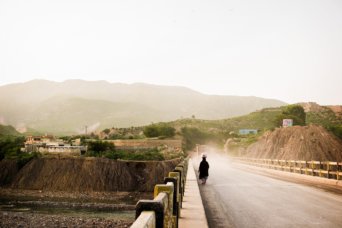- About
- Topics
- Picks
- Audio
- Story
- In-Depth
- Opinion
- News
- Donate
- Signup for our newsletterOur Editors' Best Picks.Send
Read, Debate: Engage.
| topic: | Freedom of Expression |
|---|---|
| located: | Pakistan |
| editor: | Shadi Khan Saif |
The clutches of Pakistan’s powerful military establishment are slowly but certainly snatching the ever-shrinking space for freedom of speech in the online media after dominating the traditional media.
On the heels of brazen intimidations to silence the dissent, the ruling quarters in Pakistan under the clear directives of the powerful army have now floated an idea to ‘regulate’ web TV. The hidden intentions are evident: to undermine digital rights and freedom of expression, particularly the voices of dissent and critical journalism surviving in the digital arena after being pushed out of the so-called mainstream media through systematic and violent tactics.
Blowing the whistle on it, the Paris-based press freedom watchdog Reporters Without Borders has categorically warned that the proposal follows the general lines of an earlier one giving federal agencies extensive online censorship powers which the government unveiled in January 2019 and had to withdraw after it was heavily criticized. It is now trying again on the pretext that it needs to regulate content on video platforms such as YouTube and Vimeo, and TV streaming services (also known as OTT) such as Netflix.
Signalling to the underlining issue, it says by means of pressure and harassment, the Pakistani authorities have been forcing more and more journalists to censor themselves in the traditional media, with the result that the internet has become one of the few remaining spaces where independent voices can make themselves heard.
Just last week, the Federal Investigation Agency threatened to slap terrorism charges on one of the country’s most prominent government critics. Gul Bukhari, a prominent columnist and democracy activist, has been directed to appear before an inquiry probing ‘online propaganda’ against the government, national security organizations, and the judiciary. In the same charge-sheet, the FIA threatened to seek extradition of Bukhari who lives in self-exile in Britain after she was briefly kidnapped by unknown gunmen in the eastern city of Lahore in June 2018.
Bukhari like many other social media users with an impressive following is particularly critical of the Pakistan army.
Alarmed by the recent move to regulate the online space, citizen groups in Pakistan have also rejected the proposed draft regulations on web TV and other allied attempts to undermine digital rights and freedom of expression.
In an open letter, prominent public figures, media practitioners, digital rights advocates, human rights groups, legal fraternity and the broader civil society in general, said they are alarmed and angry at recent government attempts clearly aimed at curtailing fundamental rights to free speech and access to information through blatant attempts to restrict digital rights, as well as hijacking of cyberspace to curb open discourse and online socio-economic freedoms and pluralism.
Not surprising that Pakistan ranks 42 out of 180 countries in the RSF’s 2019 World Press Freedom Index, three places lower than in 2018.
Image: Samina Kousar / Pixabay

